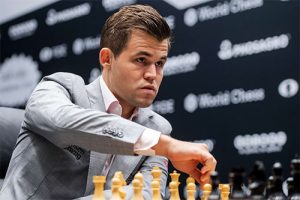Magnus Carlsen: In Pursuit of Perfection and Committed to the Art of Chess

The best chess player ever? It’s probably Magnus Carlsen, according to … Magnus Carlsen.
The Norwegian grandmaster, now 28, is one of those rare individuals able to mix arrogance with charm and still make friends. His unassuming demeanour hides his genius, and as he has matured, that genius has lost all trace of wickedness. Other than that which comes only into play on the chess board, of course.
Carlsen is a universal player who adheres to no signature style; he easily adapts to, and ruthlessly exploits, any situation. Carlsen is celebrated for detecting even the most minute advantage – and transforming it into a crushing victory.
The Norwegian maintains his composure under the most trying of circumstances. He does not engage in soul-searching, and seems to suffer none of the psychological lapses that plague some grandmasters. This sangfroid often gives Carlsen the upper hand and allows him to unsettle his opponents, enticing them to make tiny mistakes and then exploiting them. The Norwegian’s endgame is anaconda-like, never giving an inch and working towards the “crack” (and ultimately victory).
Though Carlsen holds the highest recorded chess rating – 2882 on the Elo scale – he has not reinvented the game. That accolade goes to players such as the Soviet-Latvian grandmaster Mikhail Tal, “The Magician from Riga” (1936-1992). In the 1960s, Tal stunned game watchers with his attacks, creativity, and fearless improvisation. According to chess great Garry Kasparov, who coached Carlsen for two years, the era of chess innovation is largely over.
This is fine by the Norwegian, who finds enough room within the boundaries of convention to develop his game.
If Carlsen must be likened to any grandmaster, the best fit would probably be Boris Spassky, the Soviet half of the most famous chess clash of all times: the 1972 match in Reykjavík against American Bobby Fischer. The match paralleled the Cold War US-Soviet standoff, pitting the superpowers against each other on the chess board. Though Fischer won that momentous competition, he subsequently descended into a disturbed psychological state, becoming a Holocaust-denier, recluse, and a fugitive from the law.
Carlsen shows no inclination towards eccentricity and keeps his eye on chess without becoming obsessed by it. The Norwegian refuses to become an automaton, and keeps a human perspective on the game. He refuses to play against computers, admitting that the experience of losing against an inanimate object is not something to relish.
No need then for him to challenge the AlphaZero AI chess programme developed by Google offshoot DeepMind. AlphaZero uses machine learning to master any game; in just four hours, and starting with random moves, AlphaZero has “learned” to play chess to lethal perfection. Within 24 hours, it was able to beat another “robot” player, Stockfish 8, in a 100-game tournament. AlphaZero didn’t lose a single match.
Though still very much a machine, AlphaZero AI takes a more empirical and human approach to chess, learning by trial and error, and analysing the outcome of experimentation as opposed to merely crunching numbers. Stockfish 8 evaluates around 70 million moves per second, but AlphaZero AI need only work out 80,000 positions to make up its digital mind – creating added knowledge in the process.
The DeepMind experiment unveiled a vast range of successful moves and tactics not previously employed, providing grandmasters with new vectors to explore and exploit. Carlsen is known to analyse and study the AI approach, and take some cues to which he can add his own intuitive twists.
That is, perhaps, the reason for Carlsen’s enduring success and popularity – the ability to remain human and accept the frailties that implies. Still a whisker ahead of the competition, Carlsen admits that he may already have passed his prime. Then again, there is nothing left for him to win.
The acceptance of fallibility is what makes Carlsen unique among grandmasters.
You may have an interest in also reading…
From Croatia to Chile – The Luksic Family: From the World’s Driest Desert to the Forbes List
In Chile, everyone knows the Luksics and their remarkable story that started with Policarpo Luksic who left his native Croatia
Winnie Byanyima: From the Bush to the Global Stage
Oxfam International’s dynamic director Winnie Byanyima possesses a most extraordinary CV. Her career includes working as Uganda’s first female aeronautical
Smart City Prince: A Prince with a Mission, a Vision
For anyone familiar with the dashing Crown Prince of Dubai, it would have come as no surprise to find him


















































































